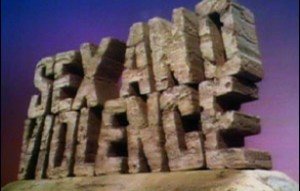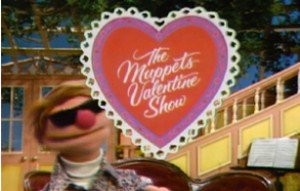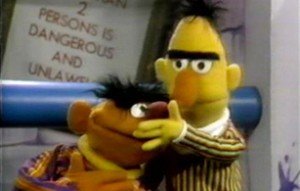The Muppet Show: Sex and Violence
After the first Muppet Show pilot, The Muppets Valentine Show, failed to be picked up to series, Jim Henson and Co. shot yet another pilot in December 1974, which like Valentine, made it to air as a special on ABC (this one in March 1975) but the network similarly opted to not take it any further. And as much as I sympathize with the frustration Jim must have felt, I can’t actually say that I entirely either disagree with or don’t understand ABC’s decision. Although, as with Valentine, this special, Sex and Violence–available as a bonus feature on The Muppet Show Season 1 DVD set–displays many of the features that would become beloved Muppet Show staples, this show has still not yet found its voice.
Read MoreThe Muppets Valentine Show
In 1973, Jim Henson decided to once again pitch a TV variety show starring the Muppets, which had been a goal of his since all the way back in the immediately-post-Sam-and-Friends era but which had always failed to come to fruition due to American network executives not being able to get over their bias that puppets were for children, despite all the evidence as to how much adult audiences enjoyed the Muppets when they made appearances on other peoples’ shows and even on Sesame Street.
Jim’s written pitch announced that the “time is right for a variety show hosted by dogs, frogs, and monsters…The show is aimed at the adult or young adult audience, but it is a show for the whole family…The Muppets,
Read MoreSesame Street Test Pilot
After the success of the Sesame Street pitch reel, the public television heads of NET (which actually had already become PBS by the time the first episode of the show aired in November 1969) wanted the Children’s Television Workshop to produce a number of test pilots to experiment with the format for the upcoming show, and so the CTW and Jim produced 5 complete trial episodes in June 1969, each with different segments, in order to see how children would respond to them, and–in a truly awesome move–the producers of the Sesame Street: Old School Volume 2 DVD set decided to include the first one as a bonus feature, which is what allowed me to watch it for this post.
What might be most fascinating as well as strange about it is how overall
Read MoreThe Wizard of Id, Etc.
Today, once more we have a number of shorter Henson clips to look at before returning to the first season of Sesame Street the day after tomorrow. We begin with The Wizard of Id, a brief pilot based on the famous comic strip by Johnny Hart and Brant Parker, which was first launched in 1964 and continues to run to this very day. Although the show never came to be–apparently by the time the creators of Id started to demonstrate interest in the project, Jim already became too busy with Sesame Street and other projects–it’s significant as being the first time that Jim and his team ever designed puppets based on someone else’s work. Here, it was three puppets designed to look like characters from the strip.
One could also see why Jim might have been less interested in it because it wasn’t his own work. The script also isn’t as inspired as those written for his own characters and feels very much like short back-and-forth comic strip scenes brought to life in succession. It’s even entirely possible that they did just use lines from the original strips, but either way it has a rather choppy quality. Now, it’s also possible that that is because this was just a brief 5-minute pilot and they would have broken out of this format had they filmed a full episode or went to series. But as it is, this feels more like a curiosity than a truly intriguing what-might-have-been such as Tales of the Tinkerdee is. It does, however, end on a cute bit in which the Wizard blows up each of the characters, then himself, saying: “Yes, sir, it’s a standard Muppet finale. If you don’t know how to end it, go out with a–” BANG!
Read More
Sesame Street Pitch Reel
“I think there was a kind of collective genius about the core group that created Sesame Street, but there was only one real genius in our midst, and that was Jim.”–Joan Ganz Cooney, co-founder of Children’s Television Workshop
And now, we finally come to the origins of one of the most seminal programs not only in Jim Henson’s career but television history, period: Sesame Street, a show that debuted near the end of 1969 and to this very day continues to educate pre-school children, while entertaining both them and their parents with warmth and intelligent humor, managing to make learning feel not didactic but fun and endlessly imaginative.
Read More




